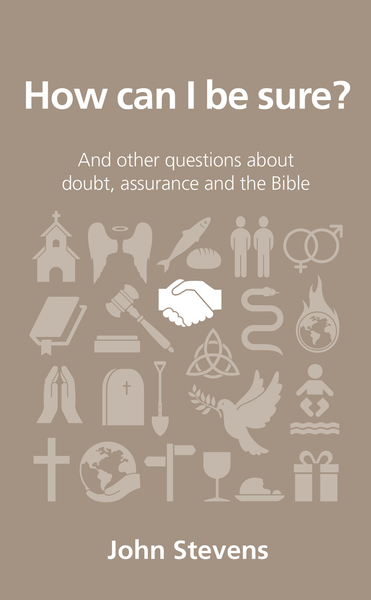
In this extract from his book published today, John Stevens talks about his own experience of doubt in himself and others. John is the National Director of the Fellowship of Independent Evangelical Churches in the UK.
I became a Christian in 1988 while I was a law student. I had grown up in a non-Christian family, and started university as a convinced atheist. I became a Christian through the witness of a number of friends from my course, who shared the good news about Jesus with me and invited me to numerous evangelistic meetings.
I resisted God’s call on my life for more than a year, but finally trusted in Christ at the beginning of my final year. Given that I had already had to overcome my scepticism and unbelief to become a Christian, I started out with a confident faith in Jesus. I was conscious of growing in faith and enjoying a new relationship with God. However, over the years I found that I had to face new doubts. I continued to struggle with sin and was frustrated by my failures. Sometimes God felt distant and I wondered whether my relationship with him was real. I discovered new theological and philosophical challenges to my faith and the truthfulness of the Bible. I felt the frustrations of seeing little fruit from my ministry and the disappointments of being let down by church and other Christians.
Five years after I had become a Christian, my father died from lung cancer without ever, to my knowledge, professing faith in Christ. Watching him die painfully and slowly inevitably made me question my faith in a new way. How could a God of love allow such a slow, painful and lingering death? Was it really possible to believe in a bodily resurrection? Would a loving God really send those who had rejected Jesus to eternal punishment in Hell for ever? I had faced some of these questions intellectually, and knew what the Bible said, but my experience meant that I now faced them in a different way. They were no longer abstract questions of moral philosophy but bound up with the loss of someone I had loved. It took me several years to recover a confident and assured faith after the anguish of this time.
I have now been involved in church leadership for almost twenty years. During that time I have had the privilege of ministering to all different kinds of people, at all stages of life. I have spent time with many who have struggled with doubts, or a lack of assurance about their salvation. Some have struggled with intense and long-lasting doubt and they have endured a real fight to keep their faith. Whether a period of doubt is short or long, it usually robs Christians of their joy, peace and delight in God, and prevents them serving him wholeheartedly and sacrificially. It turns them inwards as they search their hearts and consciences for signs of real faith, and may cause them paralysing fear as to whether they are believers at all.
Doubt is one of the hidden struggles that many Christians face. Christians know that they are meant to be people of “faith”, and so they find it hard to admit that they are struggling with doubt. You may fear that other Christians will respect you less, stop you from serving in ministry, or even withdraw their friendship. However, it is vital that we are honest about the problem, so that we can find help and recover a joyful and confident faith.
You may be reading this because you are struggling with doubt yourself, or because you know others who are struggling. My prayer is that you will be reassured to discover that doubt is a common experience for God’s people, and that you will be helped to grow stronger in your faith.
How can I be sure? is part of the best-selling Questions Christians Ask series. It is available here or from The Good Book Company website.